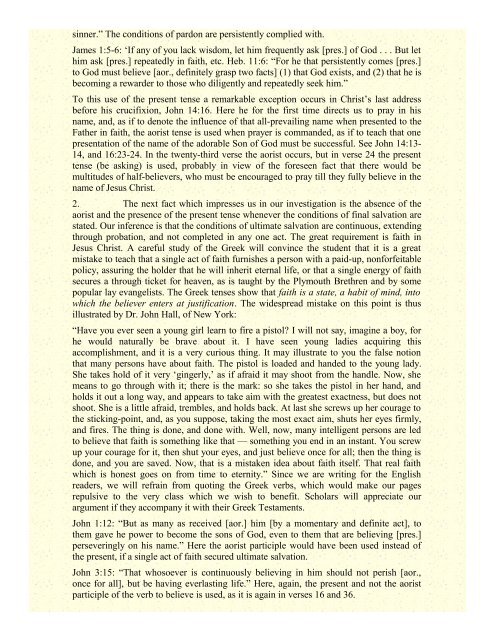2. The Meaning of Sanctification - Enter His Rest
2. The Meaning of Sanctification - Enter His Rest
2. The Meaning of Sanctification - Enter His Rest
Create successful ePaper yourself
Turn your PDF publications into a flip-book with our unique Google optimized e-Paper software.
sinner.” <strong>The</strong> conditions <strong>of</strong> pardon are persistently complied with.<br />
James 1:5-6: ‘If any <strong>of</strong> you lack wisdom, let him frequently ask [pres.] <strong>of</strong> God . . . But let<br />
him ask [pres.] repeatedly in faith, etc. Heb. 11:6: “For he that persistently comes [pres.]<br />
to God must believe [aor., definitely grasp two facts] (1) that God exists, and (2) that he is<br />
becoming a rewarder to those who diligently and repeatedly seek him.”<br />
To this use <strong>of</strong> the present tense a remarkable exception occurs in Christ’s last address<br />
before his crucifixion, John 14:16. Here he for the first time directs us to pray in his<br />
name, and, as if to denote the influence <strong>of</strong> that all-prevailing name when presented to the<br />
Father in faith, the aorist tense is used when prayer is commanded, as if to teach that one<br />
presentation <strong>of</strong> the name <strong>of</strong> the adorable Son <strong>of</strong> God must be successful. See John 14:13-<br />
14, and 16:23-24. In the twenty-third verse the aorist occurs, but in verse 24 the present<br />
tense (be asking) is used, probably in view <strong>of</strong> the foreseen fact that there would be<br />
multitudes <strong>of</strong> half-believers, who must be encouraged to pray till they fully believe in the<br />
name <strong>of</strong> Jesus Christ.<br />
<strong>2.</strong> <strong>The</strong> next fact which impresses us in our investigation is the absence <strong>of</strong> the<br />
aorist and the presence <strong>of</strong> the present tense whenever the conditions <strong>of</strong> final salvation are<br />
stated. Our inference is that the conditions <strong>of</strong> ultimate salvation are continuous, extending<br />
through probation, and not completed in any one act. <strong>The</strong> great requirement is faith in<br />
Jesus Christ. A careful study <strong>of</strong> the Greek will convince the student that it is a great<br />
mistake to teach that a single act <strong>of</strong> faith furnishes a person with a paid-up, nonforfeitable<br />
policy, assuring the holder that he will inherit eternal life, or that a single energy <strong>of</strong> faith<br />
secures a through ticket for heaven, as is taught by the Plymouth Brethren and by some<br />
popular lay evangelists. <strong>The</strong> Greek tenses show that faith is a state, a habit <strong>of</strong> mind, into<br />
which the believer enters at justification. <strong>The</strong> widespread mistake on this point is thus<br />
illustrated by Dr. John Hall, <strong>of</strong> New York:<br />
“Have you ever seen a young girl learn to fire a pistol? I will not say, imagine a boy, for<br />
he would naturally be brave about it. I have seen young ladies acquiring this<br />
accomplishment, and it is a very curious thing. It may illustrate to you the false notion<br />
that many persons have about faith. <strong>The</strong> pistol is loaded and handed to the young lady.<br />
She takes hold <strong>of</strong> it very ‘gingerly,’ as if afraid it may shoot from the handle. Now, she<br />
means to go through with it; there is the mark: so she takes the pistol in her hand, and<br />
holds it out a long way, and appears to take aim with the greatest exactness, but does not<br />
shoot. She is a little afraid, trembles, and holds back. At last she screws up her courage to<br />
the sticking-point, and, as you suppose, taking the most exact aim, shuts her eyes firmly,<br />
and fires. <strong>The</strong> thing is done, and done with. Well, now, many intelligent persons are led<br />
to believe that faith is something like that — something you end in an instant. You screw<br />
up your courage for it, then shut your eyes, and just believe once for all; then the thing is<br />
done, and you are saved. Now, that is a mistaken idea about faith itself. That real faith<br />
which is honest goes on from time to eternity.” Since we are writing for the English<br />
readers, we will refrain from quoting the Greek verbs, which would make our pages<br />
repulsive to the very class which we wish to benefit. Scholars will appreciate our<br />
argument if they accompany it with their Greek Testaments.<br />
John 1:12: “But as many as received [aor.] him [by a momentary and definite act], to<br />
them gave he power to become the sons <strong>of</strong> God, even to them that are believing [pres.]<br />
perseveringly on his name.” Here the aorist participle would have been used instead <strong>of</strong><br />
the present, if a single act <strong>of</strong> faith secured ultimate salvation.<br />
John 3:15: “That whosoever is continuously believing in him should not perish [aor.,<br />
once for all], but be having everlasting life.” Here, again, the present and not the aorist<br />
participle <strong>of</strong> the verb to believe is used, as it is again in verses 16 and 36.









